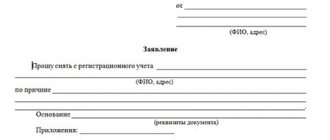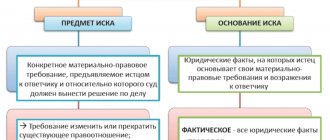One of the most sensitive housing issues is the forced eviction of an unwanted tenant. More often than not, evicting someone from an apartment, room, or house without the consent of the evicted person is associated with conflicts between residents. Forced discharge is a measure of last resort, therefore in most cases it is permissible by court decision. An exception is the discharge of a conscript for military service, a convicted person, someone missing or deceased.
In general, it is not always possible to evict a person from a home solely at will. We have to resort to discharging the citizen through the court.
Can a property owner sign out a registered relative?
The owner of the property can dispose of it at his own discretion. Alienate the ownership of other citizens or transfer to other persons the rights of ownership, use and disposal of their property, while remaining the owner. When the need arises to register a citizen, it is important to take into account the desire of the person registered, his degree of relationship with the owner and the fact of residence.
If the wishes of the owner and the registered citizen coincide, then everything is simple. The registered person collects documents and applies for deregistration to the Main Department of Migration Affairs of the Ministry of Internal Affairs or fills out an application electronically on the State Services website.
If a citizen does not agree to voluntarily be discharged or his whereabouts are unknown, he should go to court (clause 1 of article 35 of the RF Housing Code and subclause 5 (e) of clause 31 of Government Resolution No. 713 of July 17, 1995).
What laws regulate the procedure for registration and deregistration of citizens:
- Decree of the Government of the Russian Federation dated July 17, 1995 No. 713 “On approval of the Rules for registration and deregistration...”. Extract and registration of citizens at the place of stay or residence.
- Order of the Ministry of Internal Affairs of Russia dated December 31, 2017 N 984 “On approval of the Administrative Regulations...”. The procedure and timing for consideration of citizens' requests for the provision of public services for registration of citizens of the Russian Federation.
- Part 4 art. 31 Housing Code of the Russian Federation. If family relations with the owner of the premises are terminated, the former member does not retain the right to use this premises, unless otherwise provided by agreement.
- Clause 2 Art. 292 of the Civil Code of the Russian Federation In the event of transfer of ownership of an object to another person, the right to use the premises of family members of the previous owner is terminated, unless otherwise provided by law.
Procedure
Algorithm of actions for discharge of a relative, in case he agrees to the procedure :
- On a certain day, you visit the passport office together with a relative, having prepared a package of documents - a house register, passports (we talked about which authorities are involved in the discharge procedure here).
- Fill out forms for extract/registration at a different address.
- Submit your documents for verification.
- Waiting for a date to be set when you can pick up the documents.
Application for registration at the place of residence form and sample.
Application for deregistration at the place of residence, form and sample of completion.
Algorithm for discharging a relative without his consent :
- You contact the court, where they issue a list of documents required to be provided.
- You collect a package of papers.
- You are waiting for the court's decision.
Algorithm for expelling a rowdy relative from a municipal apartment (Article 91 of the Housing Code of the Russian Federation):
- Systematically write statements of complaint to the municipality about the antisocial behavior of a relative, make a copy of the document, and give the original to the addressee.
- Systematically calls representatives of the law to calm the violent one, after which you make a copy of the document confirming the arrival of the police.
- You go to court with the above set of documents.
How can an owner expel a registered relative from an apartment?
Family members of the owner of the residential premises have the right to use this premises. According to paragraph 1 of Art. 31 of the Housing Code of the Russian Federation - family members of the owner include the spouse, children and parents, as well as other relatives, if they are declared by the owner during registration as members of his family (grandfather/grandmother, brother/sister, grandson/granddaughter, son/daughter-in-law, mother-in-law/ father-in-law)
They are not family members of the owner - uncle/aunt, nephew/niece, cousin/sister, common-law husband/wife, friend, acquaintance, stranger.
Write out your spouse or ex-spouse
- The apartment was purchased before marriage, received by inheritance or as a gift:
- If the marriage is not dissolved and family relationships are terminated and one of the spouses does not live at the place of registration, you can agree with him on deregistration. If it is impossible to reach an agreement, an extract through the court.
- After a divorce, the spouse who is not the owner of the apartment loses the right to reside in the apartment and can leave voluntarily. Otherwise, the spouse-owner files a claim in court to terminate the rights to use the residential premises. When a positive court decision comes into force, the plaintiff needs to bring a copy of the decision to the passport office and the defendant will be discharged. The defendant has lost the right to use the apartment and does not have the right to be in the apartment without the consent of the owner (clause 2 of article 30 of the Housing Code of the Russian Federation). All that remains is to pack your things and move out.
- The apartment was purchased during marriage:
- Even if the ex-wife is not the title owner, the apartment is considered the common property of the spouses (Clause 2 of Article 34 of the RF IC) and according to the law, “half” belongs to the ex-wife. But the owner of the property cannot be written out, even if he does not live in it (Clause 1, Article 209 of the Civil Code of the Russian Federation). In this case, it is better to divide the property.
Write out your daughter-in-law or son-in-law
Let's look at how to discharge this category of citizens, using the example of deregistering a former son-in-law. If the former son-in-law does not want to check out on his own, the owner of the apartment files a claim in court.
It is important to consider how the owner indicated his daughter’s spouse when registering.
If recorded as a son-in-law or husband of a daughter, then this citizen is a member of the family. After divorce, family relations cease and the son-in-law, as a former family member, does not retain the right of residence.
In the case where the son-in-law is not registered in any way, it means that the owner registered him as an outsider and has the right to terminate the agreement for gratuitous use at his own request (Clause 1 of Article 699 of the Civil Code of the Russian Federation).
Discharge of a minor child
Legislation protects the housing rights of minor children. According to paragraph 2 of Art. 20 of the Civil Code of the Russian Federation—the place of residence of minors is the place of residence of their legal representatives. The main conditions for the discharge of minor children are:
- A child can only be discharged together with one of the parents.
- The parent who needs to be discharged along with the child is not the owner of the apartment.
The owner of the apartment will not be able to sign out his minor child, even if the parents are divorced and the child lives with the other parent at a different address.
Extract from parents' apartment
The mother or father can be discharged in the following cases:
- Parents do not live at the place of registration for a long time. Here it is important for the owner to prove that the person registered has another living space. If the person registered proves that he has nowhere to live, the judge may make a decision - to retain the right to use the apartment for a certain period. At the end of the term, this category of citizens is discharged by court decision.
- Parents are deprived of parental rights. The court may oblige the parent deprived of parental rights to vacate the apartment, even if he is its owner.
If they voluntarily consent to discharge, the parents submit an application to the Main Migration Department of the Ministry of Internal Affairs.
Discharge of other relatives
Aunts, uncles, grandmothers, grandfathers, cousins and second cousins are discharged voluntarily, or the owner discharges them by court decision. In this case, the owner must indicate in the statement of claim that a citizen of this category of relatives is not a family member.
Going to court
The answer to the question: how to expel my son from an apartment without his consent, if I am the owner, will be: “Go to court!” This always happens , except in cases where the extract is carried out with mutual consent of the parties.
It is very difficult to discharge a person against his will . Factors such as retirement age, poor health, minority, lack of stable sufficient income may be accepted by the court as not giving the right to remove a person from a certain living space.
We talked about how forced deportation occurs in court here.
For some, such a court decision may mean that unbearable living conditions will continue, but for others it will be a chance to maintain decent living conditions in a situation where close relatives turned out to be their worst enemies.
How to discharge a registered person through the MFC
The easiest way to check out of an apartment is through the MFC. Reception and verification of documents occurs in one window and takes no more than 15 minutes. To do this you need:
- pre-register online or by phone at the MFC;
- submit documents and passports to perform the service;
- receive passports with a stamp confirming registration actions.
The citizen is discharged independently; the presence of the home owner is not required. If, along with the extract, a citizen wants to register at a new address and he is not the owner of the property there, then it is necessary to provide the consent of the owners of the property at the new place of registration.
To simultaneously deregister and register, you must provide the following package of documents:
- applicant's passport;
- application for registration;
- application for deregistration;
- title documents for housing at the new place of registration (in the case where the applicant is the owner);
- owner's consent to registration (if the applicant is not the owner).
Application for registration at the place of residence (form No. 6) was approved by Order of the Ministry of Internal Affairs of Russia dated December 31, 2017 N 984. The application indicates the following information:
- applicant details:
- FULL NAME;
- Date of Birth;
- Place of Birth;
- Information about:
- previous place of residence;
- new registration address;
- information about the owner of the property;
- document that serves as the basis for moving in;
- signatures:
- the owner who provided the premises;
- registered resident.
Sample application for registration at place of residence
| Application for registration at the place of residence |
Sample application for deregistration at the place of residence
| Application for deregistration at the place of residence |
Deadlines for registration of citizens
When citizens apply in person to the MFC with a complete package of documents and no comments, the application is processed in approximately three days, plus two to three days for sending documents from the MFC to the Ministry of Internal Affairs and back. MFC employees will tell you when to come for the completed documents. These services are provided free of charge.
Judicial resolution of the issue
The owner or tenant of municipal housing (responsible tenant) has the right to expel the remaining residents from the apartment through the court. To do this, you will have to prove through the court system that the defendant has lost the right to reside at the specified address.
The main reasons that may be taken into account in court:
- the citizen’s absence from this address for a long time (the law does not define a specific time frame, but if the absence is more than a year, you can take a certificate from the Criminal Code or invite neighbors);
- whether a person has his own home or other place of residence (confirmed by an extract from the Register of Owners or testimony of witnesses);
- changed family circumstances (for example, the spouse was registered in the apartment that the husband rents, but after the divorce he decided to write her out of there);
- a person uses the living space for another purpose, does not comply with the rules of cohabitation, violates the rights of others or public order, leads an antisocial lifestyle, this can be confirmed by the testimony of eyewitnesses or a local inspector.
To substantiate your position, you need specific evidence: how long a person does not appear in the apartment, how long he evades payments for utility services, how he violates the rules of residence, and so on.
In order to initiate a judicial procedure and be discharged from an apartment without the consent of the tenant, you must first send him a notice that someone else’s home should be vacated.
In legal practice, a rule is applied according to which the owner of an apartment and the person living in it act under an oral agreement to provide free housing. The owner can terminate the previous legal relationship and must inform about his decision one month in advance.
The notification should be sent by registered mail with a list of attachments to prove that the tenant was contacted. The receiving address must indicate the address of the apartment from which the plaintiff intends to discharge the defendant; it is necessary to keep the delivery notice and fiscal receipts. These actions help determine how to discharge a person from a municipal apartment or from his own through a court decision.
After a month of waiting, the owner or responsible tenant can file a statement of claim to have the person removed from the apartment without consent. You need to prepare the following documents:
- passport information about the identity of the plaintiff;
- an extract on ownership or provision of municipal housing;
- certificate in form No. 9, which shows those living at this address;
- statement of claim, substantiated, detailed, with the necessary arguments and with the necessary copies attached;
- payment for payment of state duty, which for non-property claims for individuals costs 300 rubles.
- receipts from housing and communal organizations and other documents that show the costs of maintaining and preserving housing (repairs, replacement of communications);
The court takes into account the material and living conditions of both parties and the results of the preliminary settlement of the dispute. In this case, you should formulate your request correctly: you are asking to recognize that the citizen has lost the right to be in the residential premises.
The department for registration of migration of citizens within the structure of the Ministry of Internal Affairs is responsible for deregistration at the place of residence. Therefore, the court decision must be delivered specifically to the department of the Ministry of Internal Affairs or to the nearest MFC.
Important!
It is necessary to convince judicial representatives that the person does not live, does not carry out repairs, and does not comply with his obligations to pay for housing and communal services. Therefore, you need to worry about evidence in advance: regularly send registered letters with an offer to pay utility bills or help in improving the living space.
The courts make an unambiguous decision in certain circumstances: if the mortgaged apartment is alienated in favor of the bank, if a person goes abroad, if a citizen is convicted and serving a sentence.
Good to know!
Discharge and eviction of a person after a court decision are different procedures; discharge is a legal substantiation of the position of the owner or tenant. Eviction is the actual restriction of access to the apartment, replacement of locks, return of things.
1 room apartments on Moskovsky Prospekt Go to
Deregistration at the place of residence through State Services
To receive a service through the “State Services” portal, you must be registered on this site and complete the following steps:
- go to the State Services website;
- click on the “Registration at your place of residence” section;
- select the required service:
- registration of a citizen at the place of residence;
- registration of a citizen at the place of residence;
- deregistration at the place of residence;
- deregistration of a citizen at the place of residence;
- fill out an application electronically;
- send an application;
- wait for the results of its verification;
- At the appointed time, visit the department of the Main Department of Migration Affairs of the Ministry of Internal Affairs and obtain documents.
Consequences of discharge without new registration
The migration registration department or the passport service very often states that a citizen is required to register at his place of permanent residence within a period of up to 7 days from the date of arrival (at a place of temporary stay - 90 days).
And subsequently they issue administrative fines allegedly for violating the law, using the date of deregistration. However, the law clearly states “from the date of arrival”, and not “from the day of deregistration”.
There is no exact definition of “day of arrival” - the date of purchase of housing, date of settlement or arrival in this city. Therefore, you can refuse to draw up a protocol and contact the supervisory authorities if they do not accept your documents or do not give them back without drawing up a protocol or paying a fine.
Another problematic point is possible: very often, when checking out through the passport office at the management company (management company), residents are forced to pre-pay the debt for utility services in order to accept documents for registration and put the appropriate stamps. This requirement is completely illegal and cannot be enforced against the person's consent.
How to discharge a relative through the court
A problematic situation arises when a living relative refuses to check out and vacate the living space. You can discharge a relative without his consent through the court.
Step-by-step instruction
Deregistration without consent through the court:
- Prepare a statement of claim and a package of documents.
- Notify the defendant of the upcoming trial. Documents must be sent by a valuable letter with a list of attachments.
- Submit a statement of claim and other documents to the court. Contact the court at the location of the property.
- Receive a determination on the date of the preliminary hearing.
- Come to the preliminary meeting. At the preliminary hearing, the judge listens to the parties' demands and reviews the submitted documents.
- Receive a summons for a court hearing.
- Take part in legal proceedings. The judge will announce the requirements of the claim, listen to the parties, testimonies of witnesses, and ask questions for clarification.
- The court's decision is announced.
- Pick up the court decision from the court office.
- We are waiting for the decision to come into force.
- We submit an application to remove the defendant from registration.
Documents for going to court
Basic package of documents for going to court:
- statement of claim - the number of copies according to the number of participants in the case;
- document confirming ownership;
- document - the basis for the emergence of rights;
- certificate of registration;
- passport;
- receipt of payment of state duty.
Statement of claim for termination of the right to use residential premises and deregistration
The form and content of the statement of claim must comply with the norms of Article 131 of the Code of Civil Procedure of the Russian Federation. The statement of claim must be submitted in writing, with the obligatory indication of the following information:
- name of the court;
- plaintiff's details;
- information about the defendant:
- Full Name;
- Date and place of birth;
- location;
- the circumstances on which the plaintiff bases his claims;
- evidence confirming these circumstances;
- list of submitted documents;
- date of compilation and signature.
Sample statement of claim for termination of the right to use residential premises and deregistration
| Claim for termination of the right to use residential premises |
State duty and deadlines
The state fee when filing a claim is three hundred rubles. The case is considered and resolved by the court before the expiration of two months from the date of receipt of the application to the court. Court decisions come into force after the expiration of the period for appeal.
Making a statement
When drawing up a statement of claim, indicate:
- name of the judicial institution;
- Full name of the plaintiff, contact details;
- Full name of the defendant, contact details (if possible);
- data of an official confirming the existence of grounds for discharge - for example, OUFMS.
The text of the application indicates the reason why they are asking to discharge the tenant and lists the laws of the Russian Federation on the basis of which the court can satisfy the claim. Be sure to briefly formulate your request for an extract.
List the attached documents. At the end they indicate their last name, put the date, and sign.
We talk in more detail about the rules for drawing up statements of claim for forced discharge here.
Grounds for expulsion from living space without a person’s consent
The court will satisfy your claim (as the owner of the apartment) on the following grounds:
- The specified person has not been living at the fictitious place of registration for a long time and deliberately , and there are witnesses to this fact. If a registered person deliberately changes addresses and hides (from the army, the law or alimony), it makes sense for the owner to write him out.
- The registered person deliberately damaged the housing in order to harm its communications, environment, etc.
- Prescribed antisocial lifestyle , alcoholism and drug addiction, violation of the rights of other persons living in the house, threat to health or life.
- His deprived parent (both) is removed from the property owned by a minor. In this case, other living space is not provided.
- Reprivatization of housing and/or adjacent land in favor of the state , which is a violation of the law.
- Divorce of the owner from the spouse , non-recognition of paternity. In this case, housing should not be joint property: usually the one who owned the apartment (house) before marriage writes out the former partner. The owner will have to prove that the living space was purchased independently (was given as a gift or inherited).
- Change of owner of the home, the need for a housing transaction . The purchase and sale of an apartment or house will not take place as long as someone is registered in the living space. First of all, homeowners check out themselves, then non-tenants sign out.
- Large debts to pay for utilities if the owner and the registered owner maintain separate households and have different personal accounts. It's enough to not pay rent for six months.
- A so-called “temporary deregistration” is required : the person registered does not want to be deregistered completely, but he faces a long absence - the army, many years of study in another city, or imprisonment in the MLS. In this case, after release (demobilization, graduation from a university), the person can restore registration.
- Discharge of a deceased person is a mandatory procedure: a death certificate is attached to the main documents.
- A missing person has been missing for five years and there is no reliable information about him. It is enough for a participant in hostilities not to make himself known for more than two years. The best option is to recognize the person as dead, obtain a certificate and discharge him.
Even if your reasons are legal and appropriate, it is better to call the hotline. The specialist will consider your individual case from the point of view of many years of practice and advise the best option for you.
What does registration (registration) of a citizen affect?
Registration of a person in a given residential area implies that he is granted the following rights:
- living in an apartment;
- use of property in the apartment, as well as common property in the house as a whole;
- registration of an individual entrepreneur;
- registration of a pension certificate and individual taxpayer number;
- registration of benefits and subsidies;
- sending a child to school or another educational institution;
- Getting a Job;
- registration of one’s own children under 18 years of age and other relatives in this area;
- consent to registration of other people.
What documents will be needed?
To apply to court regarding an extract, you must have:
- social tenancy agreement or real estate order;
- lawsuit;
- copy of personal account;
- papers confirming violations of the rules of residence by the tenant.
Such documents may be the right of ownership of the property in which the defendant permanently resides, complaints from neighbors about his unworthy behavior or a copy of the administrative protocol, etc.
If the owner writes it out, you will need:
- documents confirming his ownership;
- personal documents;
- certificate of payment of the duty;
- statement of claim.








